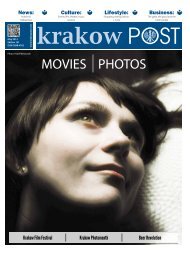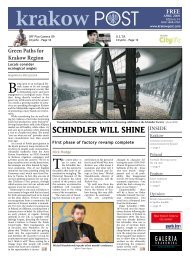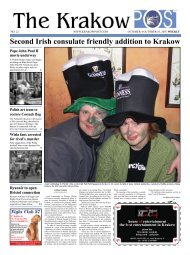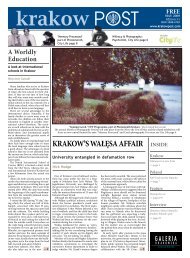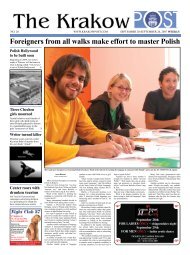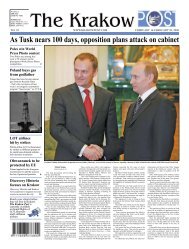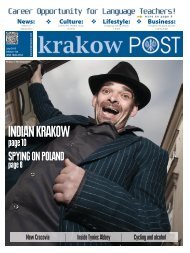Local superintendent may change face of educational ... - Krakow Post
Local superintendent may change face of educational ... - Krakow Post
Local superintendent may change face of educational ... - Krakow Post
You also want an ePaper? Increase the reach of your titles
YUMPU automatically turns print PDFs into web optimized ePapers that Google loves.
DECEMBER 13-DECEMBER 19, 2007<br />
Celebrating the year <strong>of</strong><br />
Stanislaw Wyspianski<br />
the krakow post<br />
The year 2007 is the hundredth anniversary<br />
<strong>of</strong> the death <strong>of</strong> Stanislaw Wyspiański,<br />
one <strong>of</strong> the most intriguing and broad-minded<br />
Polish artists.<br />
The phenomenon <strong>of</strong> Wyspainski consisted<br />
<strong>of</strong> his versatile activity, fascinating even today<br />
because <strong>of</strong> the variety <strong>of</strong> concepts employed<br />
during his short 38 years <strong>of</strong> life.<br />
He studied at <strong>Krakow</strong>’s School <strong>of</strong> Arts<br />
(1884-1885 and 1887-1895) and at Jagiellonian<br />
University (1887-1890 and 1896-1897).<br />
As a student he helped Matejko (together<br />
with J. Meh<strong>of</strong>fer) to create polychromes <strong>of</strong><br />
Mariacki Church (1889-1890). His creative<br />
activity, realized mainly through pastel technique<br />
(portraits, landscapes, flowers) was<br />
dominated by symbolism and the secession<br />
style. The main means <strong>of</strong> expression was<br />
a twining line along a contour <strong>of</strong> depicted<br />
items, which were marked through colored<br />
stains. His polychrome projects and stained<br />
glasses characterized the motif <strong>of</strong> blazing<br />
flame and calligraphically treated plants.<br />
In literature he is known as one <strong>of</strong> the best<br />
drama writers, especially tragedies.<br />
Referring to ancient tragedy, he showed<br />
the role <strong>of</strong> fate as a main motive <strong>of</strong> action,<br />
<strong>of</strong>ten localized in national historical reality.<br />
In the late period <strong>of</strong> his artistic activity (from<br />
1900), apart from historical and political<br />
polemics against contemporary life (among<br />
others “The Wedding,” “Liberation”), there<br />
appeared a trend to philosophically interpret<br />
Polish history (“The Legion,” “Boleslaw<br />
Smialy,” “November Night”) and to show<br />
mythological stories (“The Odys Return”).<br />
Wyspianski was not submissive; he could<br />
be classified as incorrigible and a rude artist.<br />
For almost all his short life (he suffered<br />
from syphilis) he fought against parochial<br />
styles <strong>of</strong> thinking and middle-class conformism.<br />
Stanislaw Wyspianski died on Nov. 28,<br />
1907 and his funeral in Deserved Crypt at the<br />
Church on the Rock became a huge national<br />
demonstration.<br />
The 100th anniversary <strong>of</strong> his death is the<br />
occasion <strong>of</strong> several artistic events at the National<br />
Museum in <strong>Krakow</strong>: exhibitions, theater<br />
plays, multimedia shows. There also are<br />
lectures and books about Wyspianski and his<br />
artistic activity.<br />
The main building <strong>of</strong> <strong>Krakow</strong>’s National<br />
Museum has an exhibition entitled “Stanislaw<br />
Wyspianski’s Great Theater.”<br />
The multimedia show runs through March<br />
2 and features static and motion pictures,<br />
sounds and light, etc. Video screenings include<br />
parts <strong>of</strong> theater, television and film<br />
adaptations <strong>of</strong> Wyspianski’s dramas. Exhibition<br />
visitors can stand inside scenery reconstructing<br />
the scene from the premiere <strong>of</strong> “The<br />
Wedding,” built according to the author’s<br />
stage direction. Janusz Walek, creator and<br />
custodian <strong>of</strong> the exhibition, says that the unusual<br />
character <strong>of</strong> the show casts a spell on<br />
visitors, expanding their imagination and allowing<br />
them to see Wyspianski as a whole.<br />
Through March 9, the National Museum<br />
will display at a Szolayski tenement house<br />
in ul. Szczepanska 11 an exhibition entitled<br />
“You Pile the Stake Yourself…” The idea is<br />
to remind visitors <strong>of</strong> the ceremonial funeral<br />
<strong>of</strong> the artist and at the same time <strong>Krakow</strong>’s<br />
last huge funeral ceremony organized by the<br />
city council.<br />
Laznia Nowa, a theater in the Nowa Huta<br />
District, joined the celebration <strong>of</strong> the anniversary.<br />
A music-theater festival, “Wyspianski<br />
Liberates,” showed Wyspianski’s other <strong>face</strong>s<br />
and ran from Nov. 28 to Dec. 2.<br />
Also at the festival was a poster display<br />
covering more than 30 billboards with such<br />
slogans as “<strong>Krakow</strong> is not enough developed!”<br />
and “I was beaten and that is why I<br />
won.” The festival also included a play directed<br />
by Paul Passini, “Resting,” and concerts in<br />
which artists challenged Wyspianski’s texts.<br />
“We do not want to embalm a mummy; we<br />
will not close Wyspianski in a crypt” said the<br />
artistic director <strong>of</strong> Laznia Nowa. “He was a<br />
Pole who tore <strong>of</strong>f the comfortable masks <strong>of</strong><br />
A R T S & I D E A S The <strong>Krakow</strong> <strong>Post</strong> 13<br />
his compatriots. He was frustrated, furious<br />
and defiant.”<br />
Another exhibition worth mentioning<br />
is “Stanislaw Wyspianski in the Art <strong>of</strong> the<br />
Disabled.” It is at Kotlownia, the Gallery <strong>of</strong><br />
<strong>Krakow</strong> University <strong>of</strong> Technology in the ul.<br />
Warszawska 24.<br />
The exhibition will continue through Dec.<br />
14 from Monday to Friday at 09:00 to 16:00.<br />
There you can find 105 works made in different<br />
techniques: painting, drawings, graphics,<br />
ceramics, weaving.<br />
The cultural events connected with the<br />
anniversary <strong>of</strong> Wyspianski’s death are very<br />
popular among foreigners living in <strong>Krakow</strong>.<br />
“I am delighted by the talent presented by<br />
Wyspianski,” said Inge, a Swedish student<br />
living in <strong>Krakow</strong> for two years. “I did not<br />
know him before. Now after participating in<br />
two projects and visiting some galleries I will<br />
probably write my MA on the topic <strong>of</strong> his<br />
nonconformist way <strong>of</strong> living and creating.”<br />
<strong>Local</strong> teacher looks to <strong>change</strong><br />
<strong>face</strong> <strong>of</strong> <strong>educational</strong> system<br />
From SCHOOL on Page 1<br />
The need to improve rural schools is so pressing<br />
that Klosowski’s reservations are inane, Lackowski<br />
said.<br />
“The deterioration <strong>of</strong> education in rural areas,<br />
where year after year more and more students<br />
do not pass their exams and thus do not continue<br />
school, is a huge problem,” Lackowski said.<br />
“With school vouchers, there <strong>may</strong> be three<br />
times more money for rural areas,” he said.<br />
“Vouchers improve the equality <strong>of</strong> education. Better<br />
teachers should go to rural areas and be better<br />
paid.”<br />
<strong>Krakow</strong> already has a voucher system but it is<br />
not the kind that Lackowski and Hall envision. It<br />
does not give parents the increase in power and responsibility<br />
that the Lackowski-Hall system would<br />
because it does not allow students to choose their<br />
school. They must go to the one to which they are<br />
assigned.<br />
“It must be <strong>change</strong>d,” said Jaroslaw Gowin,<br />
a member <strong>of</strong> the upper house <strong>of</strong> parliament from<br />
<strong>Krakow</strong>.<br />
“Otherwise people will become discouraged<br />
about a really good idea.”<br />
The <strong>Krakow</strong> voucher system does include one<br />
provision <strong>of</strong> the system that Lackowski and Hall<br />
advocate, however: It bases teachers’ salaries on<br />
the number <strong>of</strong> students they teach rather than the<br />
number <strong>of</strong> classes.<br />
Another key difference between the <strong>Krakow</strong><br />
voucher system and the system that Lackowski<br />
and Hall want is that <strong>Krakow</strong> principals have<br />
no authority to manage their schools’ finances.<br />
In other words, they can’t shift money from one<br />
category <strong>of</strong> expense to a category where there is<br />
a greater need.<br />
National <strong>educational</strong> <strong>of</strong>ficials decide how<br />
much a school gets – and the categories where it<br />
is spent.<br />
By being able to send their child to the school<br />
<strong>of</strong> the family’s choice, parents would in effect become<br />
managers <strong>of</strong> public-education funds.<br />
“In such a situation parents show their power<br />
in the <strong>educational</strong> market,” Lackowski said. “And<br />
the school principal, when talking with parents, is<br />
aware that he is speaking with the co-owners <strong>of</strong><br />
the school.”<br />
The Lackowski-Hall system would also improve<br />
teaching by pegging teacher salaries to<br />
classroom effectiveness. Better teachers would get<br />
more money, poorer ones less.<br />
Lackowski said vouchers are a tiny part <strong>of</strong> the<br />
<strong>educational</strong> <strong>change</strong> Poland needs.<br />
Creating public support for reform means convincing<br />
Poles to <strong>change</strong> the way they think about<br />
education, he said.<br />
“People must see that reform is an opportunity,<br />
not a danger,” he said. The key is getting the public<br />
to understand that “competition improves the level<br />
<strong>of</strong> education.”<br />
Under a voucher system, the best public schools<br />
wouldn’t have to beg any more for money for elective<br />
courses – those the Education Ministry doesn’t<br />
require. Neither would the best schools have to beg<br />
for money for facility renovations.<br />
Private schools also would be likely to embrace<br />
vouchers. That’s because the voucher system<br />
would allow students to go to either private or public<br />
schools. With money from vouchers, private<br />
schools could reduce the fees they charge parents.<br />
Henryka Bulat <strong>of</strong> <strong>Krakow</strong>, the mother <strong>of</strong> a junior<br />
high school girl, is one parent who likes the<br />
idea <strong>of</strong> vouchers.<br />
In deciding which school her daughter attends,<br />
she said, the voucher system will let her “take into<br />
account the schools’ achievements.”<br />
They would include the number <strong>of</strong> students in<br />
a school who had passed their comprehensive exams,<br />
the number <strong>of</strong> students who had won citywide<br />
or regionwide academic competitions, the number<br />
<strong>of</strong> electives a school was <strong>of</strong>fering and the condition<br />
<strong>of</strong> the school facility itself, she said.<br />
“If I can influence the financing <strong>of</strong> a school,<br />
why not?” she asked.<br />
A <strong>Krakow</strong> teacher who wanted to remain anonymous<br />
said it is hard for her to predict what would<br />
happen under a voucher system because few details<br />
<strong>of</strong> the system have been made public.<br />
However, she said, her sense is that “if there is<br />
a good principal who fights for his school then the<br />
level <strong>of</strong> education (under a voucher system) would<br />
be raised and that would be good for children.”<br />
Without an aggressive principal, however, the<br />
voucher system could cause such “huge problems”<br />
that a school’s quality could diminish rather than<br />
improve, she said.<br />
Lackowski has so far <strong>of</strong>fered no timetable for a<br />
voucher system or other <strong>educational</strong> reform.<br />
However, he said, “it would be best to introduce<br />
reforms gradually.” In the case <strong>of</strong> vouchers,<br />
that would mean introducing them “in big cities at<br />
a secondary school level and afterwards gradually<br />
extending them.”<br />
“Vouchers should have been introduced in cities<br />
a long time ago,” he said. “There is no reason to<br />
assign students to schools in specific districts when<br />
it is possible for them to travel by public means.”<br />
Hall said vouchers could show up as early as<br />
2009.<br />
“I am sure that any <strong>change</strong>s should be introduced<br />
very carefully, gradually and after having<br />
been given thorough consideration,” she said.<br />
Educational reform should be reform and not revolution,<br />
she said.<br />
Many teachers are likely to oppose a voucher<br />
system, <strong>of</strong> course, because it threatens the way<br />
they do business. Teacher association leaders are<br />
already posturing on the proposed <strong>change</strong>.<br />
Slawomir Broniarz, the chairman <strong>of</strong> the Polish<br />
Teachers Union, contends the voucher system<br />
would violate the Constitution in terms <strong>of</strong> unequal<br />
access to education and also laws on how local<br />
governments spend their money.<br />
Lackowski answers:<br />
“There is no need to <strong>change</strong> the constitution<br />
because education would still be free,” Lackowski<br />
said. “We need to eliminate the teacher’s card” that<br />
gives teachers too much power over education, he<br />
said. “Poland needs the determination to succeed,<br />
and the question is if Polish politicians will have<br />
that same determination.”<br />
Another teachers union objection is that, in<br />
abolishing the current school assignment system,<br />
the voucher system would create problems that<br />
would be difficult to deal with.<br />
For example, union leaders say, what happens<br />
when many more students want to attend a school<br />
than it can admit?<br />
What would be the criteria for deciding which<br />
students would get into that school and which<br />
would not?<br />
Some student groups dislike the idea <strong>of</strong> vouchers,<br />
too.<br />
Artur Juszczyk, co-leader <strong>of</strong> the student organization<br />
Initiative Against Paid Studies, contended<br />
that “the <strong>educational</strong> voucher is the first step to<br />
privatizing education. We think that education is a<br />
right, not a commodity, so it should not be subject<br />
to the rules <strong>of</strong> free market.”<br />
Those who are unsure whether the voucher<br />
system will improve schools can get an idea by<br />
looking at what happened in Koszalin, in northern<br />
Poland.<br />
That school system used vouchers to introduce<br />
a journalism class, a ballet class, speech therapists,<br />
psychological counselors and career specialists.<br />
Although vouchers are an interesting idea,<br />
many people in and out <strong>of</strong> education believe that<br />
whether they will be a success in Poland will hinge<br />
on that old adage “The devil is in the details.”<br />
EPE Translations<br />
English - Polish - English<br />
Agency providing translation services for<br />
companies working<br />
in multicultural environment as well as for<br />
private individuals.<br />
Deliver standard, technical and sworn<br />
translations at competitive prices.<br />
Also provide interpreters located in<br />
Ireland, UK and Poland.<br />
Check out www.epetranslations.com<br />
tel: (0048) (0) 12 4212300<br />
FOR PERMANENT,<br />
TEMPORARY AND<br />
CONTRACT STAFF<br />
IN IRELAND & UK<br />
• Ireland<br />
tel: (00353) 45 883420<br />
e-mail: claire@issrecruitment.com<br />
• Manchester, UK<br />
tel: (0044) 0 161 9090050<br />
e-mail: issrecruitment@yourcomms.net<br />
www.issrecruitment.com<br />
krakowpost.com



